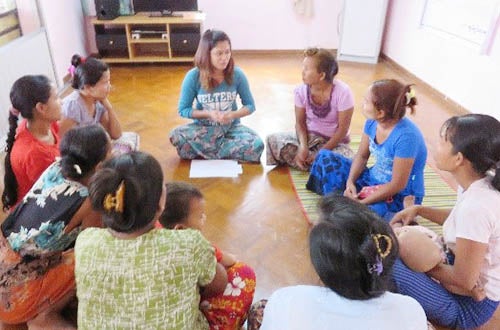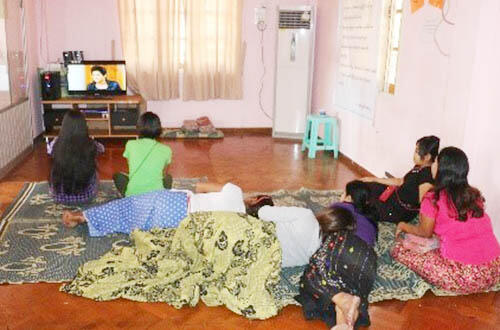The 26 year old Zin Zin (not her real name) is a native of Taungoo. She was brought up in a low income family of six. Her father, a railway worker, died of pneumonia when she was in ninth grade. The family soon moved to Yangon, with every member working hard for living. Being the youngest in the family, she was spared from working, and was supported for education.
In Yangon, she, then only 17, fell in love with and married a bus driver. The couple lived in a northern suburb and had a child a couple of years later. When the boy was three years old, he fell ill and suffered diarrhea. The boy was found to be a child living with HIV and TB. As she related, her voice almost choked, “We did not believe the medical report at first. How could that be? My son is too young to get contacted with it. So, we just went back home, and did not heed the advice that we should also do blood test. At the time, we lacked the basic knowledge on HIV.” Her son was put on the antibiotics prescriptions and grew up thin and gaunt. A couple of years later, he fell ill again and was sent to a specialist hospital on the northern outskirts of Yangon.
The parents also did the blood testing, and found they were infected, too. They were told to register for antiretroviral drug prescription. Unfortunately, the husband passed away a year later. And Zin Zin, young and helpless woman without any income, drifted back to her mother’s home. Without education and any work experience, she found it hard to find a suitable job. “Those were the very difficult days for me, indeed. I had no source of income, and no education nor expertise. One day, I met a friend who said she would find a job for me. A sex worker job. I accepted the offer as a ready means to earn a living.”
In this way Zin Zin became a sex worker. At first, her family did not know about it. However, one incident with the police revealed all: “One day, the police detained me and I had to pay a MMK 50,000 fine for my release next day. If I did not pay, I could be detained, sued and jailed for alleged “improper activities” or “being in shadow”. She was referring to the two famous Myanmar legal phrases for sex trade activities in the country.

Zin Zin’s family was shocked to hear about the plight of their youngest daughter. But Zin Zin continued with as a sex worker, as she had no other choice. “Stigma is still a big issue here. I am OK with my neighborhood and they will pretend not recognize my job. But I am not sure about other communities. In a way, it serves as an excuse for police to bully us. For my second detention, the reason was that the police found a condom in my purse.”
That was when Zin Zin came into contact with the organization called Sex Workers in Myanmar. Again, it was her friends who introduced her to the organization’s center in their neighborhood. “The center is like a godsend to me, they have the UNFPA-supported peer education program every week. These people are also of same trade as us. So it is much easier for us to talk with them. They give us useful information and advice. I have learned that condoms are the best prevention for zero infection.” The center helped her to get access to antiretroviral drugs at a township hospital. In addition, there were other women like her, and they mingled easily, sharing their experiences and helping each other as best as they could.
Zin Zin looked towards the future with more assurance: “We have started a self-help group with fellow sex workers. First, we will help spread the basic health knowledge we acquired. Many of us, despite the work of INGOs, are still ignorant about basic health information. In this way, we will grow our network. Later, we plan for vocational education so that we can leave the sex profession and start our life anew.”




